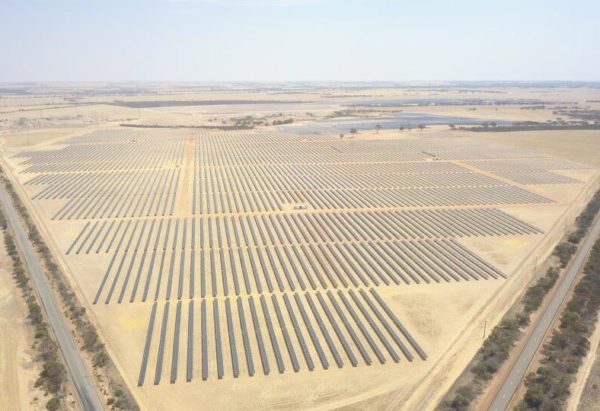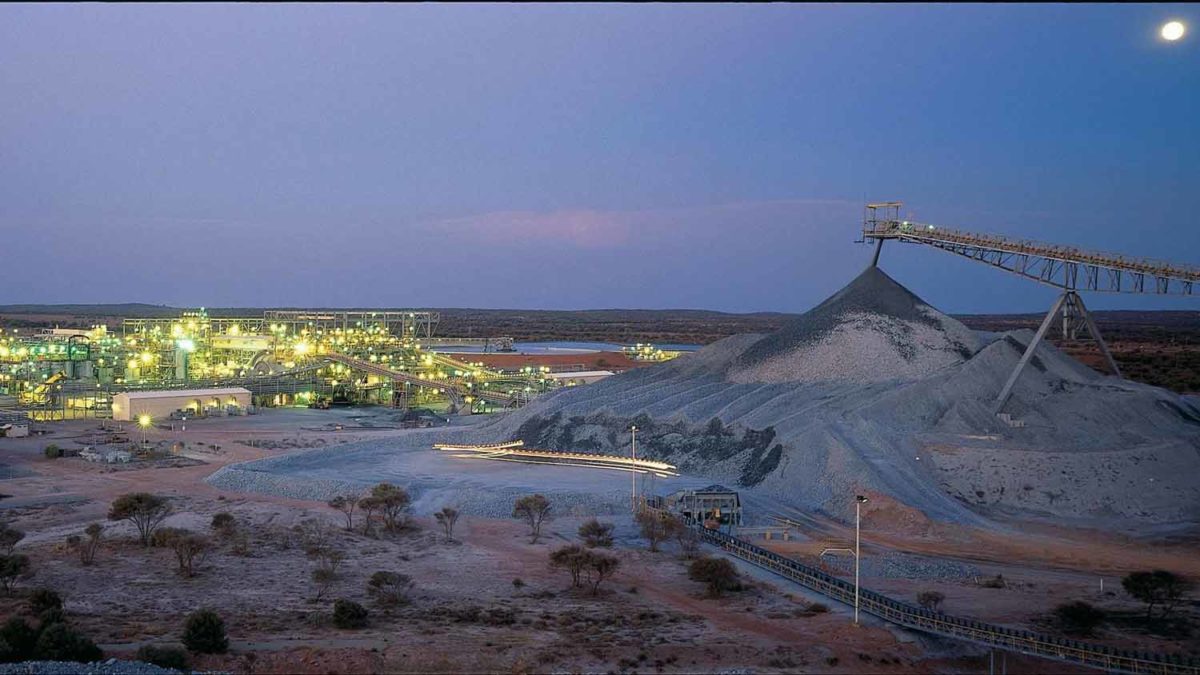In one of the first renewable power purchase agreements (PPAs) of 2021, BHP this month signed an agreement with Risen Energy for Merredin Solar Farm in Western Australia to supply up to 50% of the electricity miner’s needs for its Nickel West Kwinana refinery over the coming 10 years.
At 100 MWdc, Merredin Solar Farm is the largest to reach completion so far in Western Australia, and has been exporting at full capacity to the South West Interconnected System since August 2020.
Nickel West’s bundled PPA (which combines tradeable Large-scale Generation Certificates with purchase of power) commenced on February 1 and will displace around 364,000 tonnes of CO2 over the duration of the contract, which also has an option for extension beyond its scheduled 2031 end date.

Image: Risen Energy
Enabling a nickel-to-battery economy in Australia
Western Australia’s Minister for Mines and Petroleum, Energy, and Industrial Relations, Bill Johnston referred to the importance of nickel to renewable energy when he congratulated BHP on its initiative, saying, “BHP’s Kwinana nickel refinery is a key contributor to WA’s future battery industry, and is helping global efforts to decarbonise.”
“Nickel is a future-facing commodity and sustainable nickel production is essential to meet future demand,” said Eddy Haegel, Asset President at BHP Nickel West.
Supporting this statement, BHP reports that it sells 75% of its nickel output to global battery manufacturers and it estimates that the cumulative demand for nickel in batteries over the coming 30 years will be some 250-350% higher than during the previous three decades due to worldwide efforts to decarbonise transport by switching to battery electric vehicles.
On inking the Risen Energy deal, Haegel said, “This contract, the sulphide nature of our nickel deposits and our integrated value chain increases our position as one of the least carbon-intensive nickel miners in the world.”
BHP’s nickel sulphate plant at its Kwinana nickel refinery is expected to begin production this quarter according to BHP’s most recent annual report.
Reducing the costs of mining
The Risen PPA will help BHP achieve a medium-term target of 30% reduction in its scope 1 and 2 emissions by 2030, based on adjusted FY 2020 levels; and contribute to its long-term goal of achieving net-zero operational emissions by 2050.
The negotiated competitive pricing of the contract will also result in up to 20% reduction in the Kwinana refinery’s electricity bill.
PPAs increasingly support renewables development
Twenty-six renewable PPAs — under which a buyer agrees to purchase energy and/or LGCs at a fixed price from a solar or wind farm — were announced in 2020, according to the Business Renewables Centre Australia (BRC-A), which offers advice and support to businesses considering PPAs as part of their emissions-reduction strategies, often providing revenue certainty to investors in renewable projects under development.
Last year these PPAs included entities such as Coles supermarkets supporting development of the Western Downs Green Power Hub in Queensland; and the City of Adelaide, which entered into an agreement with electricity retailer FlowPower for supply of a solar-wind renewable blend.
In total, 2020 saw 1.3 GW of PPA-contracted renewable energy, which supported development of more than 4.5 GW of renewable generation at a time when merchant investment in renewables and investment by retailers contracted.
This weekend, Dr Chris Briggs, Technical Director at the BRC-A, wrote that Corporate PPAs have made up more than 40% of renewable-energy market offtake “in most recent quarters”, an “unexpected result” given the pandemic and resulting recession.
Sustainability targets and REZs continue to drive PPA boom
He said that ongoing growth in demand for PPAs, “is underpinned by buyers with sustainability targets or policy goals, and/or those that are taking a longer-term perspective on the value of the PPA as a hedge against volatile electricity prices”.
Briggs foresees state-sponsored Renewable Energy Zones (REZs) encouraging an ongoing pipeline of PPAs. He says that, “facilitating PPAs between local industry and solar and wind farms has been identified by governments as a priority to support economic development, benefit sharing within the REZs and the development of a social licence for the development occurring within regional areas”.
The Merredin Solar Farm PPA is BHP’s first with a renewable generator in Western Australia. It follows the miner’s signing in September last year of a 5-year semi-renewable energy PPA (combining output from solar, wind, hydro and gas) with the Queensland Government-owned CleanCo, to help offset some of the electricity used at its coal mines in that state.
Risen Energy, a Chinese PV module maker, acquired the then nascent Merredin Solar Farm in 2018, and progressed funding and engineering design, through to installing some 360,000 Risen Energy solar panels and operating the solar farm, as part of its goal “to deliver 2 GW of clean energy to Australia”, said John Zhong, local Vice General Manager of Risen Energy.
He added, “This agreement will bolster current and future Western Australian renewable projects. We look forward to welcoming many more clean energy partnerships to power manufacturing, minerals processing and other Western Australian industries.”
This content is protected by copyright and may not be reused. If you want to cooperate with us and would like to reuse some of our content, please contact: editors@pv-magazine.com.









2 comments
By submitting this form you agree to pv magazine using your data for the purposes of publishing your comment.
Your personal data will only be disclosed or otherwise transmitted to third parties for the purposes of spam filtering or if this is necessary for technical maintenance of the website. Any other transfer to third parties will not take place unless this is justified on the basis of applicable data protection regulations or if pv magazine is legally obliged to do so.
You may revoke this consent at any time with effect for the future, in which case your personal data will be deleted immediately. Otherwise, your data will be deleted if pv magazine has processed your request or the purpose of data storage is fulfilled.
Further information on data privacy can be found in our Data Protection Policy.